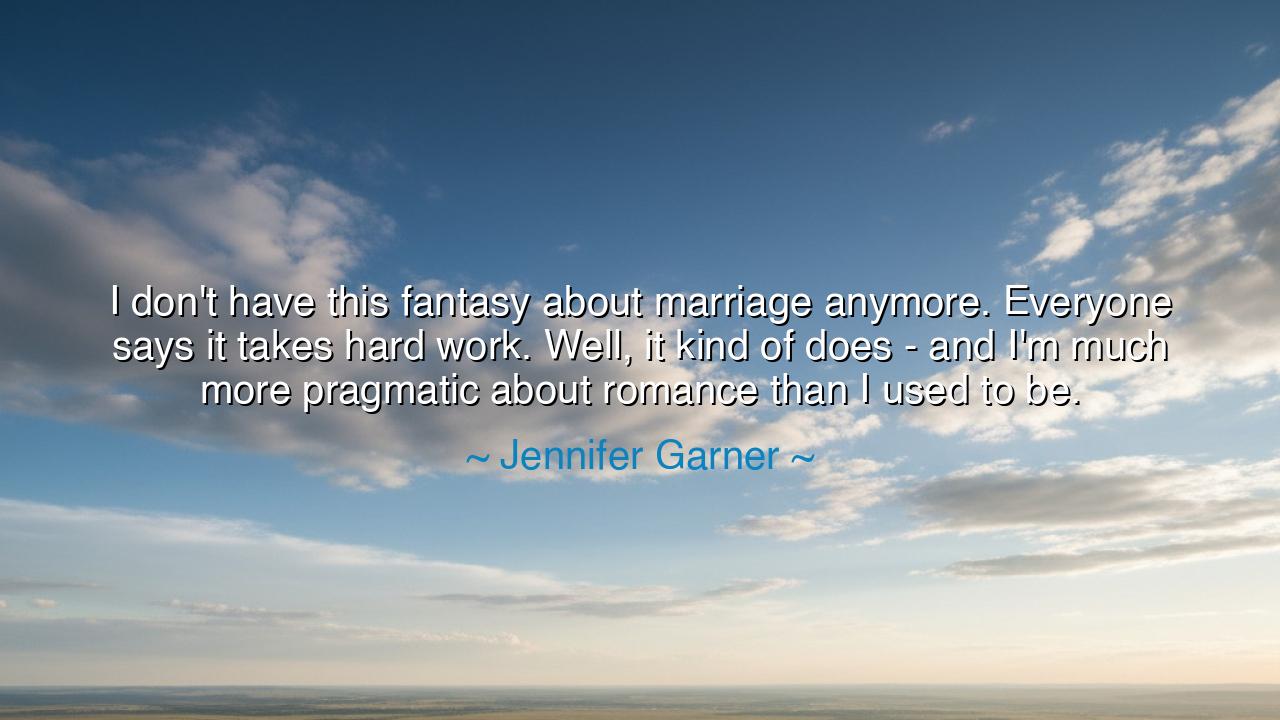
I don't have this fantasy about marriage anymore. Everyone says
I don't have this fantasy about marriage anymore. Everyone says it takes hard work. Well, it kind of does - and I'm much more pragmatic about romance than I used to be.






When Jennifer Garner said, “I don’t have this fantasy about marriage anymore. Everyone says it takes hard work. Well, it kind of does – and I’m much more pragmatic about romance than I used to be,” she was not abandoning the idea of love—she was rediscovering its truer form. Her words carry the quiet wisdom of someone who has walked through both the sweetness and the sorrow of union. They reflect a transformation familiar to all who have loved deeply: the journey from idealism to understanding, from youthful illusion to mature grace. What she speaks of is not the death of romance, but its rebirth in reality.
In her confession lies an echo of the oldest truth—that love is not sustained by dreams alone. The ancients knew this well. They spoke of marriage not as a flight of passion but as a sacred discipline, where two souls must labor as gardeners to keep the garden of affection alive. Garner’s words remind us that love, though divine in origin, is human in maintenance. The fantasy fades not because love fails, but because we begin to see that the glow of love must be tended with patience, forgiveness, and courage. The flame that once burned bright on its own must now be fed with daily care.
When she says she has become “pragmatic about romance,” she does not mean cynical. Pragmatism in love is the awakening from enchantment into stewardship. It is the realization that affection is not a perpetual gift—it is a choice renewed each day. The great philosopher Aristotle once wrote that love is not an emotion but a virtue: a habit of the heart formed by action. So too, Garner’s words suggest that to love well is to work wisely—to know that every marriage passes through both sunlight and shadow, and only those who labor through both find lasting peace.
History offers many examples of love refined through struggle. Consider the story of Odysseus and Penelope, whose bond endured twenty years of distance and trial. While Odysseus fought monsters abroad, Penelope fought despair at home. Their love did not survive because of fantasy—it endured because of faith, resilience, and patience. When he returned at last, they did not embrace as dreamers, but as survivors. That, too, is what Garner’s words speak to: that real love is not about perfection—it is about endurance. It is the art of remaining steadfast when the illusion of ease dissolves.
Her reflection also carries a gentle warning against the illusions that culture paints around romance. Many are taught to expect that love should always feel effortless—that marriage will complete what is lacking within. But Garner reminds us that love is not the filling of an emptiness; it is the joining of two imperfect souls who must build something together from their imperfections. To be pragmatic, then, is not to love less passionately, but to love more honestly—to see beauty not in fantasy, but in truth. The ancients would call this the love of the wise: a love that forgives, adapts, and persists.
From her words we learn that the truest marriage is not a story of constant delight, but of shared labor and evolving tenderness. Love grows not through ease, but through effort. Every disagreement faced with humility, every hardship endured with loyalty, becomes a thread in the tapestry of lasting affection. In time, the fantasy fades, but what remains is something stronger: trust, companionship, and quiet admiration. These are the foundations upon which all enduring relationships are built.
So, my child, let Jennifer Garner’s wisdom guide you: do not fear the end of the dream, for it marks the beginning of the truth. When you love, love with both heart and mind. Let your affection be fiery, but let your patience be deep. When the first blush of romance fades, do not mourn it—rejoice, for now your love has roots. Remember always: fantasy may start a love, but work sustains it; passion may spark it, but compassion preserves it. For in the end, marriage is not a fairy tale—it is a craft, and those who master it become artisans of the heart.
Thus, Jennifer Garner’s words are not those of disillusionment, but of awakening. She reminds us that the truest love is not a dream one lives in, but a life one builds. And in that building—in the sweat, the laughter, the forgiveness, and the endless beginning again—we find something far greater than fantasy. We find love made real, and through it, we learn the ancient truth: that the labor of love is the most beautiful work of all.






AAdministratorAdministrator
Welcome, honored guests. Please leave a comment, we will respond soon